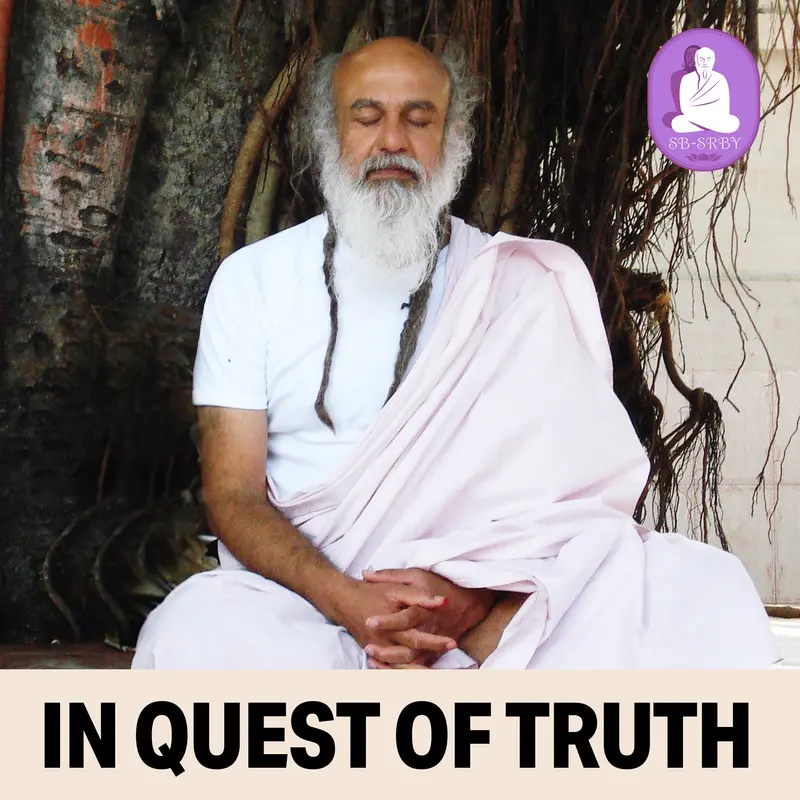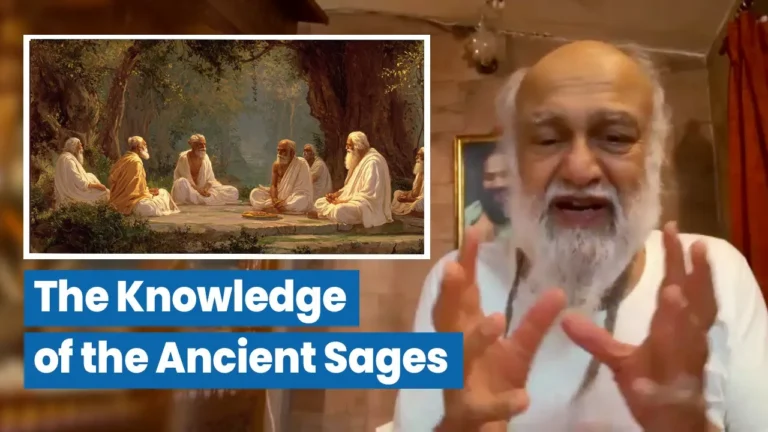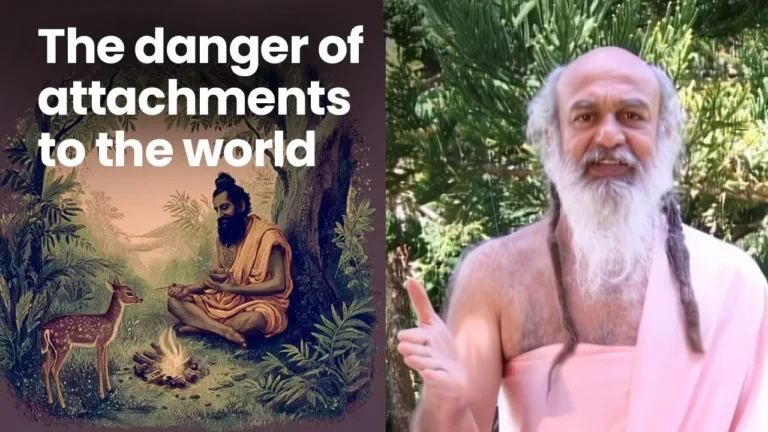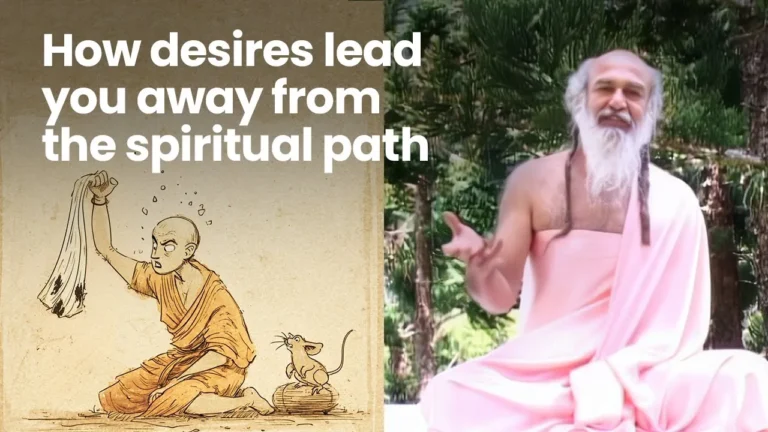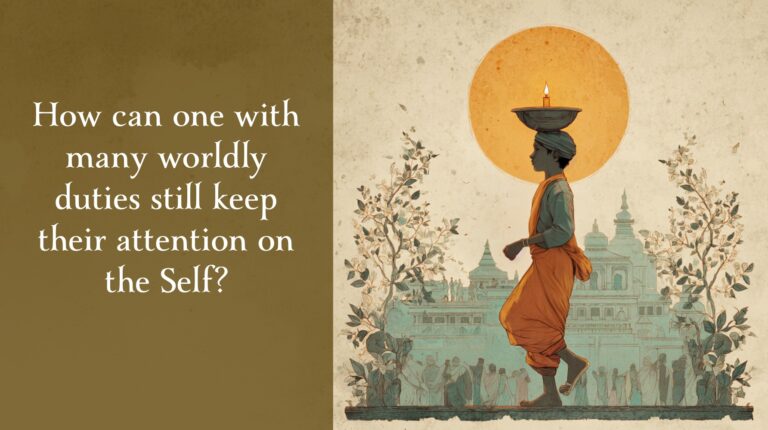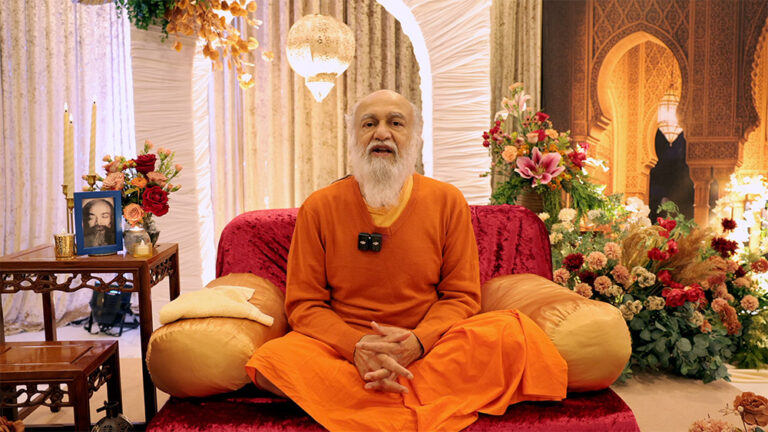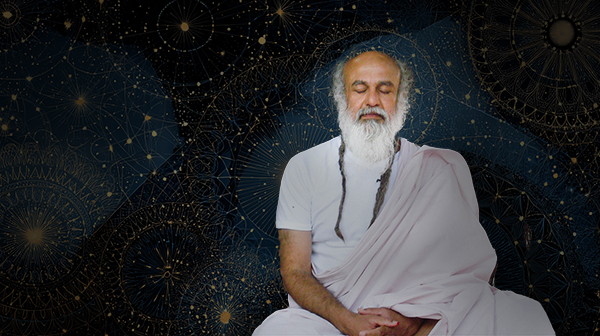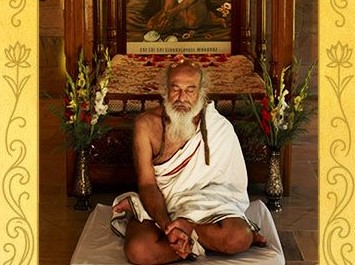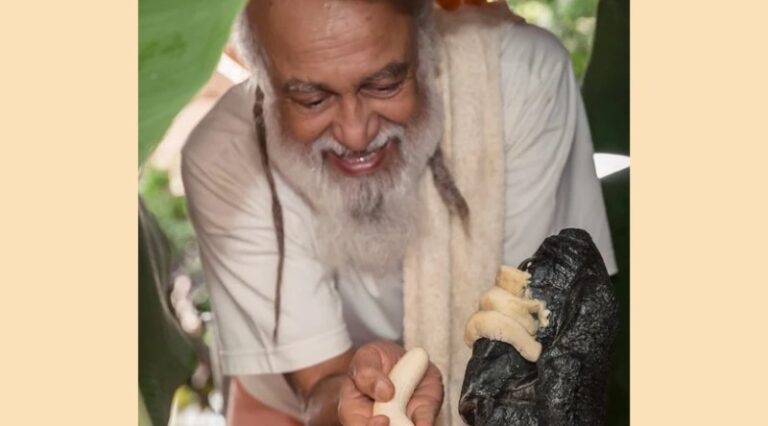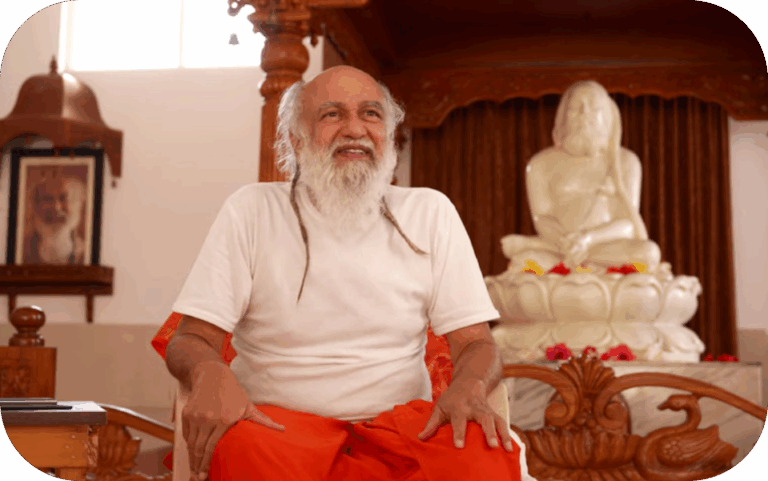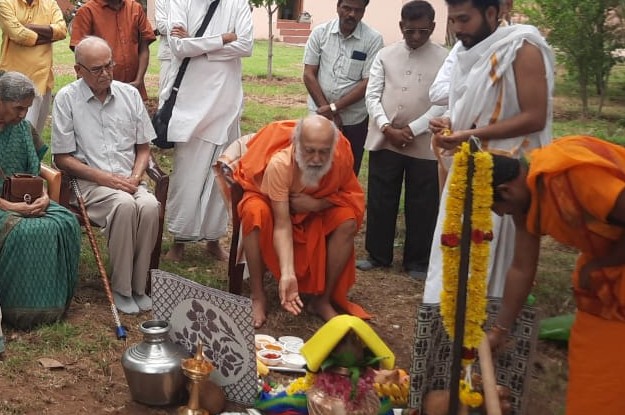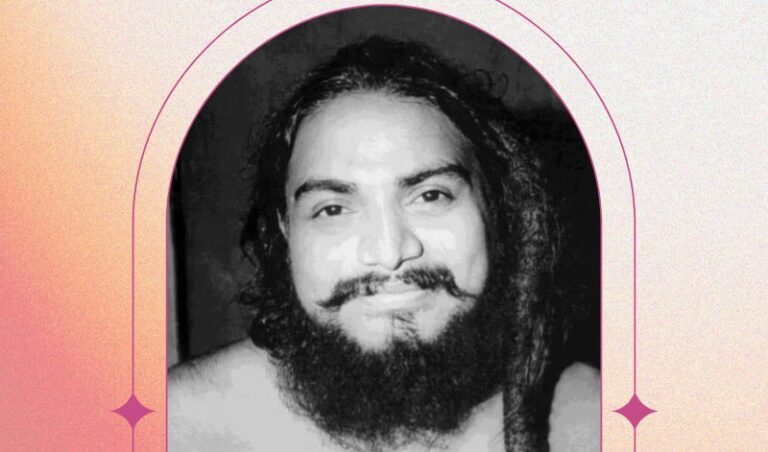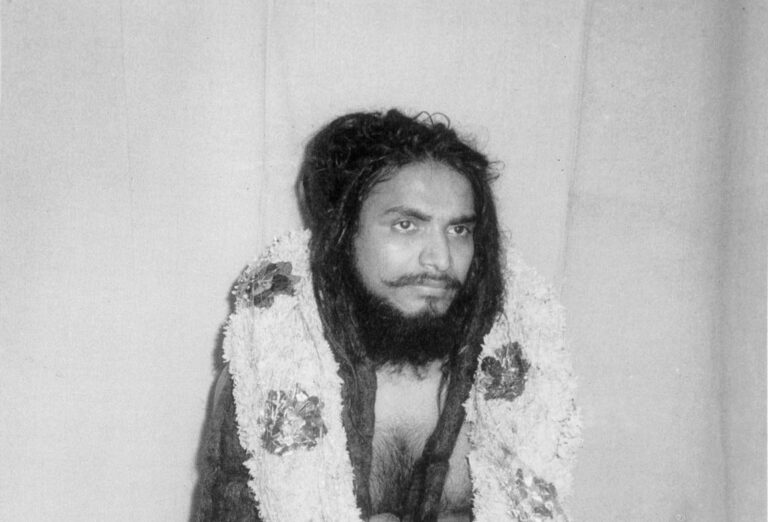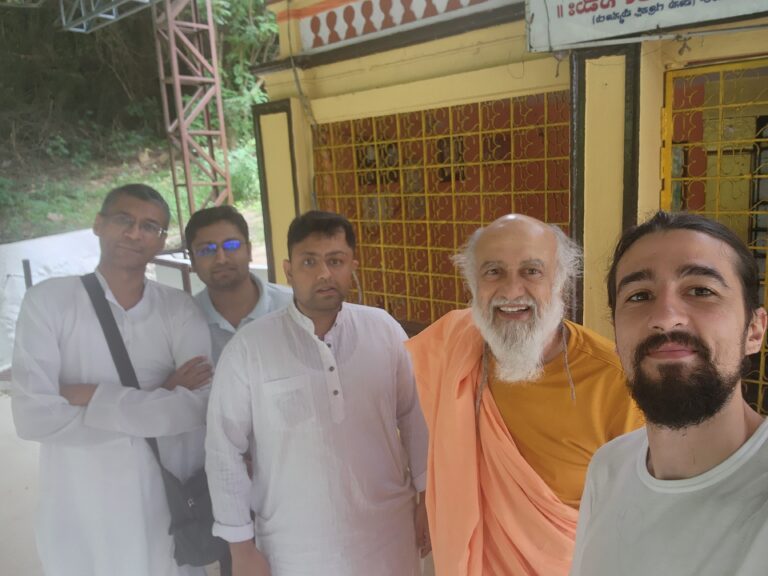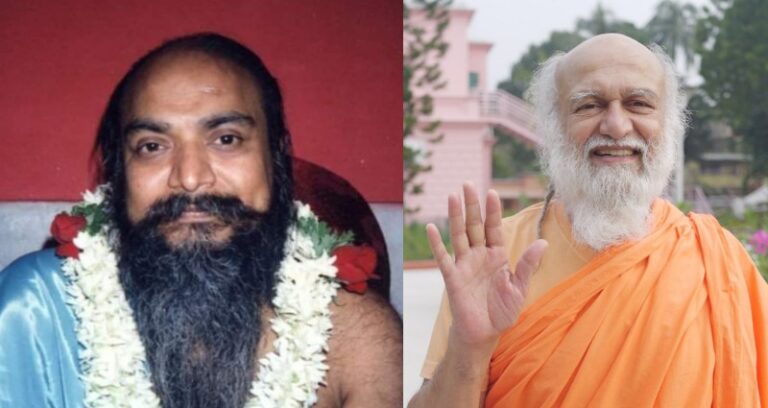Day 4 – Perth October Tour 2005
Baba entered the hall, performed aarati to Swamiji and offered His pranams, and began His talk by reciting the Guru Pranam Sloka from the Guru Gita, which can be approximately translated by;
“That enjoyer of the bliss of Brahman, beyond all imaginations, in supreme happiness, that personification of ultimate knowledge, having risen above the dualities of the creation, all pervasive and pure supreme consciousness, whose attention is always on That which is beyond the creation, existing as a single all-pervading entity, immortal, composed and at peace in itself, unmoved, and only a witness to everything, beyond all emotions, above the three creative qualities of the universe – to that Satguru I prostrate.”
Once again taking the opportunity to prostrate at the Lotus Feet of my beloved Guru Shivabalayogi a million times and a billion times over, I welcome you all this evening. We have been speaking for the last few days about the need for meditation; the need for mind control. In spirituality, the mind’s every imagination is considered an ego, however the terminology will change at different stages.
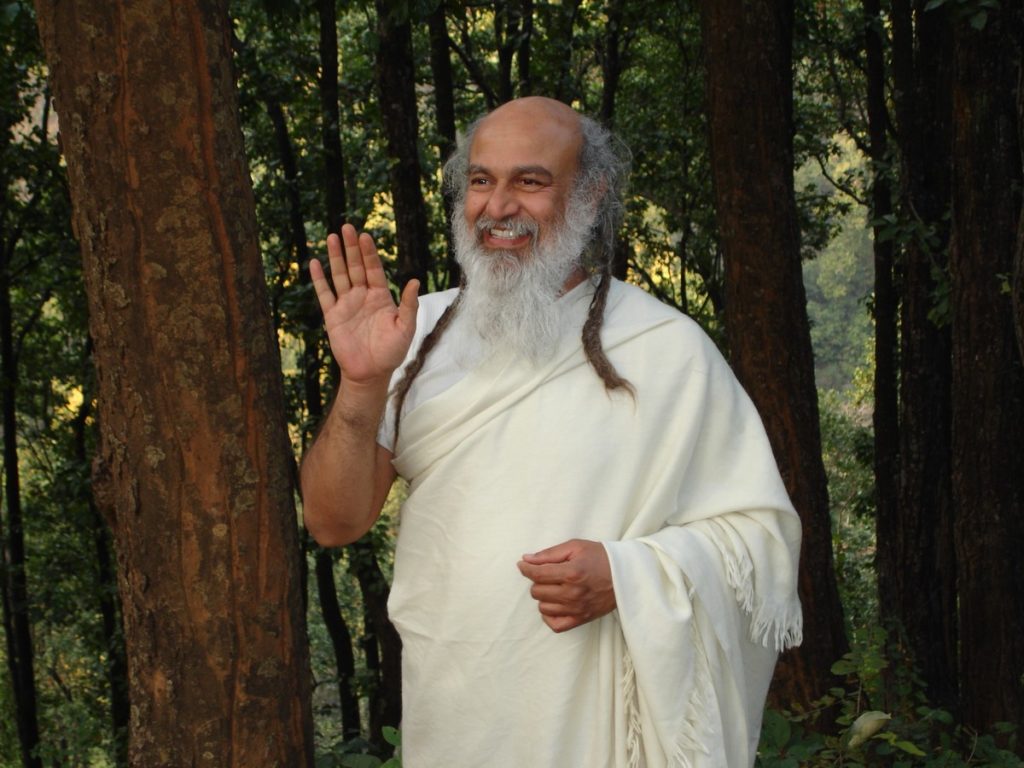
As we develop in spirituality, whereas every imagination is still just an ego, nevertheless the qualities of the imaginations change. Depending on the need or situation for the ego, they can be seen as either good, bad or ugly – in Indian spirituality these are referred to as satva, rajas or tamas.
In this way, those who are selfish, wicked, enjoy harming people, prone to greed, anger, jealousy, robbing others, full of false-pride are described as tamasic – ugly. In the Indian epic the Mahabharata, the wicked character Duryodhana would fit into this description – always acting on his own selfish imaginations, supported by his father the king.
The second type of ego, rajasic, is mainly concerned with personal glory, even though it might be in a noble way. Again in the epic, the characters of Bhishma who was noble and valiant, and Drona who taught all the princes the science of archery, could be described as rajasic. Even though they had many noble qualities, when it came to the famous scene when Princess Draupadi was threatened with public disrobing, they didn’t protect her. They used excuses such as ” I must always support the king”, and comments like this. But they simply didn’t do the right thing and stand up for a woman’s honour in this situation, because they were more interested in their personal glory.
Even Prince Yudhishthira who was so famous for being so righteous in his behaviour, through his desire for personal glory, when it came to the gambling game, he put all his wealth, even his own brothers and indeed even his wife as a bet, and lost them all. His own wife Draupadi thus had to become the servant of Duryodhana because of this. This is how Duryodhana came to have Draupadi in the situation where he could threaten to publicly disrobe her. When he threatened to do this disgraceful thing, still the famous, noble warriors like Drona, Bhishma and even Duryodhana’s father Dhritarashtra didn’t try to stop him. They knew what was right and what was wrong, but they didn’t try to simply protect her when she was in trouble like this. Draupadi asked for Bhishma’s help – he was respected by all in the court. Though he knew that this was wrong, still he used the excuse that he had vowed to see his father’s shadow on the throne of the kingdom.
This had happened many years before when his father was the king. The king had been out riding and had seen a beautiful young girl and had simply fallen in love with her and wanted to marry her. His son Bhishma, to make the marriage possible, had promised on that day that he would renounce his own right to the throne, and had vowed to protect the kingdom always – he vowed he would see his father’s shadow on the throne always. Though it was a great thing that he did – very noble – still it was for personal glory. But then when Draupadi was in this desperate situation, still he didn’t protect her, saying, “Without the king’s order, I cannot protect you.” This is rajas – acting for personal glory.
The satvic ego is seen for instance in the case of Yogis living in this world to teach others the need to control the mind. So to do this, they need to use a little of the mind’s imagination; but when Yogis do this, they don’t lose control of the mind. For instance when they talk, they use the mind’s power of imagination, but the mind is not carried away by it. They keep a small ego, a satvic ego of ” I love the Guru”, “I love His Mission” and use that small satvic ego to work in this world. Yogis have to work with good and bad people, they try to be compassionate, teach people, because if people get a chance to be in front of them it is good for those people. They try to work for a larger cause.
This is how Lord Krishna worked – not for personal glory, but for the larger cause. Just like when the war in the story of the Mahabharata was going to start, Krishna announced that each side could have either Him, or His army – whichever they chose. But if they chose Him, He would not actively fight for that side. Arjuna was noble and devoted to Krishna, so he asked Krishna to be on his side and steer his chariot – even if He didn’t fight. Hearing this the wicked Duryodhana said, “Arjuna is an idiot. Now I have Krishna’s whole army fighting on my side, while he has chosen to have only Krishna on his side – and Krishna will not be fighting for him at all.”
Even the way this had come about reflects the different egos of Arjuna and Duryodhana. When they had come to Krishna’s palace to ask for Krishna’s assistance in the coming battle, Krishna happened to be asleep on His bed, so they approached His bed and simply stood, waiting for Krishna to wake up. Now Arjuna was devoted to Krishna and so he took his place at Krishna’s feet, while Duryodhana in his arrogance stood at Krishna’s head. In that way when Krishna woke up, because Arjuna was at His feet He naturally saw Arjuna first before He saw Duryodhana, and because Krishna saw Arjuna first, He gave Arjuna the first choice of which he wanted – the whole fighting army, or just Krishna Himself – but He would not fight at all in the battle.
Now when the war itself started, Arjuna saw so many of his relatives on the other side and was overcome by a deep depression, feeling it was wrong for relatives to fight and kill each other like this. But Krishna told him, “When Bhishma and the others are supporting Duryodhana like this, they need to be punished.” Sri Krishna taught that a king should be both noble and powerful – if either is missing, it is not useful. If a king is only powerful, that is not helpful. And if he is only noble, still he can’t help without being powerful also. Krishna Himself was always a kingmaker – he didn’t need to be king Himself. His satvic nature meant He was concerned with the larger cause. Thus at one point in the battle, He picked a wheel to use as a weapon to kill Duryodhana, simply for the sake of dharma (righteousness). Seeing Krishna doing this, Arjuna told him, ‘You said you wouldn’t fight in this battle.’ But Krishna replied, ‘ It is no problem. If I do this and kill Duryodhana, only my personal name and reputation will be damaged, but all the people of the kingdom will be benefited.’ That is how a satvic ego behaves – for the larger cause.
Still if one is going to achieve something, one needs determination, needs willpower. So thus one needs to be determined, ‘I am going to practice meditation.’ While this determination is itself another ego, still if one is using it to progress on the right path, then it can be a good thing. Even if one is just stubborn, still if one uses this on the right path, it can still be a good thing – like in the case of Swamiji. He was stubborn, strong-willed by nature, and the Divine used Him to complete such a beautiful thing in His 12 years of tapas. He could perform the 12 years of tapas because of His stubbornness. After some time of doing the tapas, in the early stages, He had a lot of troubles – people would come and trouble Him, throwing things at Him and trying to disturb His tapas. One person even threw a lighted rag soaked in kerosene on His leg. It got so bad that one night He simply thought to Himself, ‘Why am I doing this? I didn’t ask for all this! I should be looking after my mother and seeing that her needs are fulfilled.’ So He got up to leave the tapas, but as He went to leave, the jangama sage appeared before Him and stopped Him from leaving. The sage instructed Him to do 12 years of tapas, and said that after that, He could go and do whatever He wishes in the world. Hearing that it would go for 12 years, Swamiji simply said, ‘O.K., now I know it is for 12 years – so I will simply do it’, and of course He was able to then complete the sadhana – as the story is well known to you all. This stubbornness in which He determined to go forward was a good thing, because He was following the right path. We can compare this to Duryodhana, who was also stubborn, but he was following the wrong path. Through his wickedness he wouldn’t give things up. Because he was stubborn, but following this wrong path, all the suffering of the society occurred through the great war and so on.
So the mind needs to be determined, but it should also be cultured.
In this way we can see that knowledge and wisdom are poles apart. Someone yesterday asked, ‘Is a Guru necessary?’ and the answer was that the Guru gives wisdom. To explain this clearly, we could say in the case of having a revolver in your hands – knowledge tells you how to fire; while wisdom tells you when to fire. So in the case of a mad person, they will just fire on everyone – they have the knowledge, but not the wisdom. In that way the Guru will teach the student like a parent teaches the child. We try to teach like this – ‘control the mind’ – then you control stress, fear, emotions, and you will be able to apply the wisdom properly. You will see in the story of the Mahabharata we spoke about earlier – Bhishma and Drona were not able to apply the wisdom properly. They didn’t protect Draupadi; if they had done this, then they would have stopped the whole great war. So thus culture is necessary as well as determination. One will find that if they practice meditation regularly, they will gain the ability to exercise wisdom properly. Thus we should become determined to do the right thing, but we also need to see the larger cause. So for me, even if 10 people want me and are yearning to learn, I will come no matter how many bad people try to obstruct.
The company of the good is also very important. It is like with a child; they need the parents’ guidance and protection, and the parents will tell them, ‘Don’t mingle with these people, because it will not be good for you.’ If the child follows the parent’s guidance, then when they grow up they can do the right things. In this way when Swamiji was teaching it was sometimes very hard, but because of the love for Swamiji we could go forward on the right path. Meditation is a purifying process. The mind has acquired imprints since time immemorial. Whenever the mind has been engaged in this world, it has absorbed imprints, acquired habits – what we call in spirituality, samskaram. How you behave in your day-to-day life will show your training – by your Guru, by your parents. If trained well, then your language in dealing with people will not be harsh or rude. Even if one is pointing out a fault in another person, one will do it nicely. One will take the care to say, “Sorry it is not possible” rather than just harshly saying, “NO!” This shows the culture of the mind.
If you do meditation, you will purify the mind and achieve mind control. You will become determined and won’t do the wrong things; you will see the benefit for the larger society. Your own home will be happier, and if the home is happy, the whole world will be happy.
Your need to do the meditation regularly – in this way one should be stubborn, and then it is a good thing. I have done this, so I know. You will get this peace, achieve that rarest thing – you will regain the awareness of who you really are – that peace beyond this world.
Nobody else can give peace for you. You have to find it yourself; no one else can give it to you. I will always pray for you all.
Questions and Answers
Question:
I was moved when you spoke about the desolation Swamiji experienced in the early stage of His tapas, and I thought of my own times like that. What should one do at such times?
Babaji:
At such times, you have to reassure yourself that everything will be alright; because every soul belongs to the real Self, the original Self. All will eventually go back there. If one has a true Guru then He will guide and inspire you to keep on, carry on. One will find that whichever path one follows there will be obstacles, and we can lose the stamina to go on. Just like the exams at university get harder as you go further in the course, in the same way the tests from the Divine get harder as one progresses on the spiritual path. But the teacher will guide and inspire you, “Never give up”, “Carry on trying” and so on. The worst thing one can do is lose heart.
One should adopt the attitude, ” Do or Die”, and simply go ahead with all courage. Throughout the history of humanity there has always been so much turmoil and struggle for humanity; but that struggle is so inspiring when we see it. So we must go on until the last breath of life. If you have a Guru, and then communicate with Him – nowadays there are so many technologies – telephone, email and so many ways we can do this. If you do this, then He will guide and inspire you. Through this communication, one will regain the inspiration to carry on.
Question:
In your last answer you instructed us, “If Guru is available, go to Him.” For 20 years I had a different Guru. I didn’t meet Swamiji physically, but I read the book ‘Tapas Shakti’, and I felt so much for Him. What I feel for Him and His teachings is so overwhelming it is difficult to put into words. Can You explain how we do go looking for the Guru?
Babaji:
Ultimately it is difficult to give a definite answer; it is all part of the Divine Play. When the soul’s time is ripe, then the Divine guides the soul to a real Guru. So many Gurus have come – Shankaracharya, Ramana Maharshi, Sri Ramakrishna. Though they have dropped their body, they are still alive through their teachings being kept properly. So we are trying to do this; Swamiji was such a great personality and great Guru. Ultimately the Guru and disciple are connected through so many lives, and thus one is guided back to them; ultimately it is Divine Grace. When I first saw Swamiji I was immediately drawn to Him, I fell in love with Him. I was attracted whether He was good or bad; there was no thinking involved in this attraction. Luckily He was a great Yogi. One really needs to be sincere to yourself, then you get the Divine’s Blessings and Grace, and this takes you to the right Guru.
Question:
When we meditate, are there any mudras (hand positions) which are helpful?
Babaji:
There are subtle currents that ran through the hands and there are some mudras which some people speak about as helpful in channeling these currents; but with this technique I have taught you, one can just hold the fingers simply interlocked and that will be helpful enough.
Question:
Babaji, can You explain cause and consequence? Particularly when one is acting and intending good, but the consequence doesn’t come to a good result.
Babaji:
Suppose I have an intention and along with this I expect a particular consequence. This will mean that I will begin to think that if I want happiness, then it should only happen this particular way. Then if it doesn’t happen that way, I will be unhappy. If the intent is truly good, then one will feel that whatever happens is for the best. So Sri Ramakrishna used to tell, “Mother knows what the child really requires.” See if the child thinks, “I want that ice-cream”, the mother may still not give it; for instance if the child is sick. If the child were sick then giving the ice cream would not be good for the child. Thus we need surrender either on the path of meditation, or in bhakti marga – the path of devotion. Then we will think, ” I want this, but don’t know how it will happen.” We will then accept that if it doesn’t happen then it is for our best. We may not understand why now, but later we will come to understand better. For myself, even since childhood I had an immense faith in God, so if something didn’t happen as I thought it should, I still thought it must somehow be for my best. Previously I have explained elaborately, “Agony is Universal Law” – but we don’t want it. The mind has jumped into this well called the World, but God has fitted the springs of Agony to throw us back to Him. My Guru used to say, a valiant soldier is happy to face the difficulties of the battlefield. He takes them simply as his task. But the coward will run away from these. The beauty of humanity is the struggle we see them going through throughout history. Swamiji would say, “Look at people worse off than you – it will give you solace. You have enough food and clothes, a house and so on – some don’t have these at all!” If people looked downcast in His presence when difficulties were coming to them, He also used to bluntly tell them, “Why are you getting terrified? You are not going to be hanged in the morning!”
Copyright © 2005 SRBY, All rights reserved.

